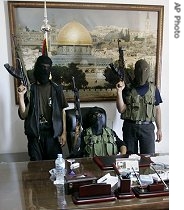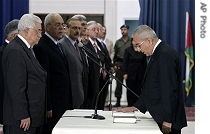2007年VOA标准英语-UN Official: Gaza Could Become Breeding Ground(在线收听)
Washington
19 June 2007
The chief United Nations coordinator of humanitarian assistance to the Palestinians is warning the Gaza Strip could become a breeding ground for more extremist groups if the already impoverished people living there fall into even greater destitution. David Shearer made the remarks during a visit to Washington and VOA correspondent Meredith Buel has details.
 |
| Hamas militants pose as they stand at the desk of Palestinian President Mahmoud Abbas in Gaza City, 15 Jun 2007 |
He told a forum in Washington that the 1.4 million Palestinians living in Gaza should not be cut off from the outside world following the violent takeover of the territory by the militant Islamist group Hamas.
"The more impoverished that Gaza becomes, it is the most impoverished place, and the less hope that people have the more fertile ground there is for additional extremism," he noted. "This is not going to confine itself just to Gaza. It is going to break out in other directions as well and ultimately impact Israel."
After the Gaza takeover, Palestinian President Mahmoud Abbas dismantled his Fatah group's coalition government with Hamas and installed a new cabinet. Hamas has refused to acknowledge the legitimacy of the new government.
The rift has, in effect, left the Palestinians with two governments - one in the West Bank that seeks peace with Israel and the Hamas leadership in Gaza, which is dedicated to destroying the Jewish state.
A small convoy of trucks carrying food and medical supplies entered Gaza Tuesday, the first such deliveries since Hamas took control after violent street battles last week.
Shearer says there needs to be at least 200 trucks per day going into Gaza to provide enough provisions to meet the needs of local people.
"The complications of that are that Israel doesn't want to deal with Hamas," he added. "Fatah doesn't necessarily want to help Hamas either. So at the moment we are in a transition period where people are trying to sort out their various policies towards each other in the new environment. But we have a pretty tight timeline in terms of being able to work that out."
 |
| Palestinian President Mahmoud Abbas, left, looks at newly-appointed Palestinian Prime Minister Salam Fayad, Ramallah, Sunday, 17 June 2007 |
The United States and Israel are expected to try to further isolate Hamas economically, diplomatically and militarily.
Shearer says with 88 percent of the Palestinians in Gaza living in poverty, more humanitarian aid needs to be delivered soon.
"People in Gaza need to be supported now," he explained. "They need to realize that their interests are the same interests of other Palestinians in the West Bank. The international community cares about them. There are people out there watching and they are trying to help the situation. I think that would give them enormous support. I think it would cut off many of the other more extremist elements that would like to try and capitalize on the current situation."
Israel is expected to tighten its economic hold on Gaza, choking off all but basic supplies.
Western officials are also pressing Egypt to secure its border with Gaza to block weapons and cash from being smuggled through tunnels to Hamas fighters.